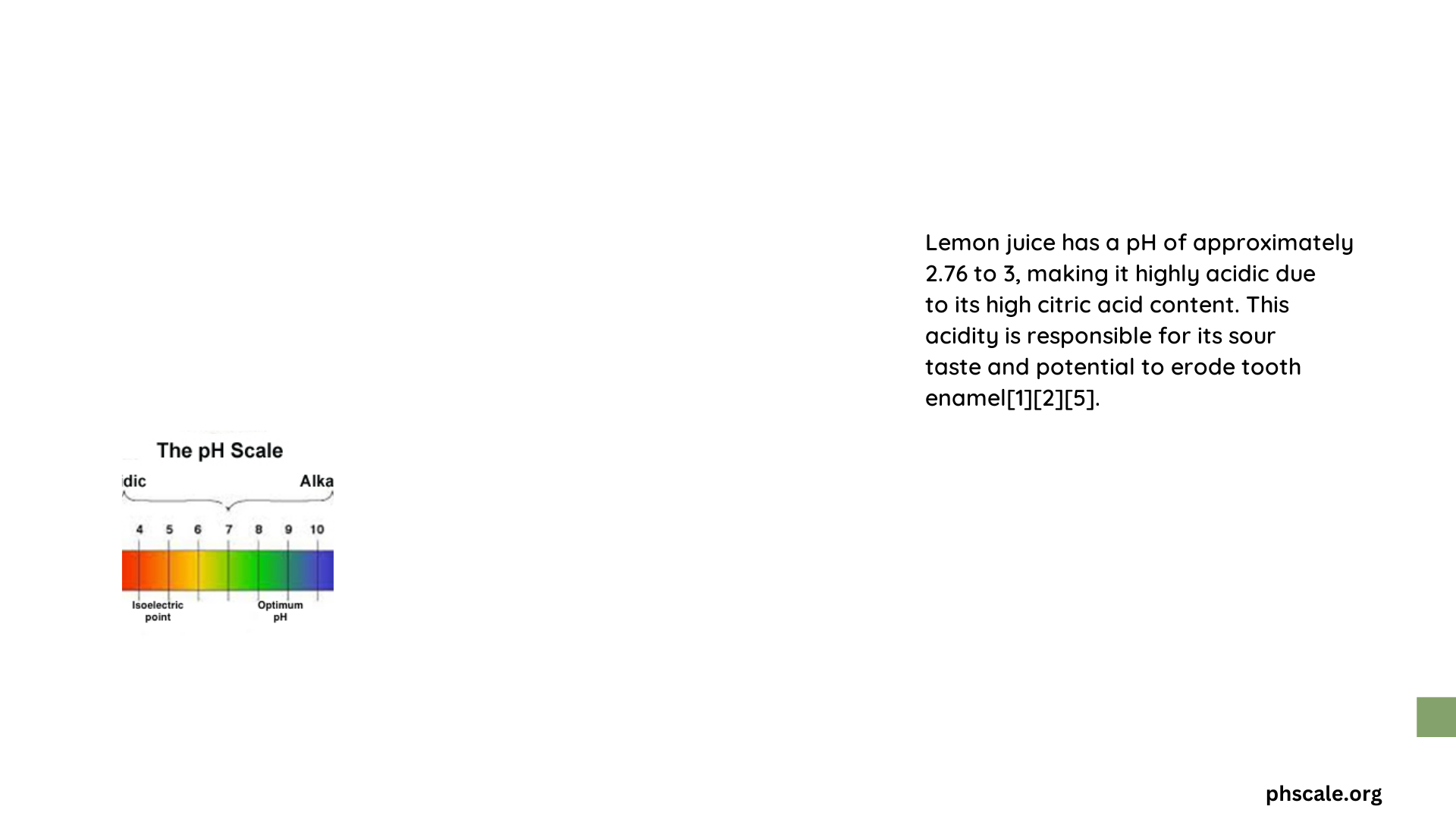Lemon juice is renowned for its high acidity, with a pH value typically ranging between 2 and 3 on the pH scale. This acidic nature is primarily due to its high concentration of citric acid, which comprises about 5-8% of the juice. The acidity of lemon juice plays a crucial role in various culinary, scientific, and household applications, making it a versatile ingredient and subject of study. Understanding the acidic pH of lemon juice is essential for its proper use and appreciation in different contexts.
What Is the pH Value of Lemon Juice?
Lemon juice has a pH value that typically falls between 2 and 3 on the pH scale. This places it firmly in the acidic category, as the pH scale ranges from 0 (most acidic) to 14 (most basic). Specific measurements have shown:
- pH meter readings: approximately 2.76
- pH paper readings: around 3
The exact pH can vary slightly depending on factors such as:
- Type of lemon
- Ripeness of the fruit
- Growing conditions
- Storage methods
Despite these variations, lemon juice consistently remains highly acidic, with its pH rarely exceeding 3.
How Does Lemon Juice Compare to Other Substances on the pH Scale?

To understand the acidity of lemon juice in context, let’s compare it to other common substances:
| Substance | Approximate pH |
|---|---|
| Battery acid | 0 |
| Stomach acid | 1 |
| Lemon juice | 2-3 |
| Vinegar | 2.5-3.5 |
| Orange juice | 3.5 |
| Coffee | 5 |
| Pure water | 7 (neutral) |
| Baking soda solution | 8.5 |
| Milk of Magnesia | 10.5 |
| Household ammonia | 11.5 |
As we can see, lemon juice is:
– More acidic than vinegar and orange juice
– Less acidic than battery acid and stomach acid
– Significantly more acidic than neutral substances like pure water
This high acidity contributes to lemon juice’s distinctive tart flavor and its effectiveness in various applications.
What Factors Influence the pH of Lemon Juice?
Several factors can affect the pH of lemon juice:
- Lemon variety: Different types of lemons may have slightly different acid concentrations.
- Ripeness: As lemons ripen, their acid content can change.
- Growing conditions: Soil composition, climate, and cultivation practices can influence the lemon’s acidity.
- Storage methods: How lemons are stored after harvesting can affect their pH.
- Processing: Freshly squeezed juice may have a different pH than commercially processed lemon juice.
How Is the pH of Lemon Juice Measured?
Accurate measurement of lemon juice pH involves specific equipment and procedures:
Equipment:
- pH meter or pH paper
- Calibration solutions (HCl, neutral buffer, NaOH)
Procedure:
- Calibrate the pH meter or test the pH paper with known solutions.
- Extract fresh lemon juice.
- Measure the pH using the calibrated meter or paper.
- Take multiple readings for accuracy.
Challenges:
- Ensuring equipment accuracy
- Accounting for variations in lemon juice samples
- Avoiding contamination during measurement
What Are the Implications of Lemon Juice’s Acidic pH?
The high acidity of lemon juice has several implications:
Culinary Applications:
- Flavor enhancement in dishes
- Natural food preservative
- Meat tenderizer
- Prevents browning in cut fruits
Scientific and Industrial Uses:
- pH indicator in experiments
- Cleaning agent
- Natural fabric dye fixative
Health Considerations:
- Can erode tooth enamel if consumed excessively
- May exacerbate acid reflux in some individuals
- Potential antibacterial properties due to low pH
How Does the Acidic pH of Lemon Juice Affect Its Nutritional Value?
The acidic nature of lemon juice influences its nutritional profile:
- Vitamin C Stability: The low pH helps preserve vitamin C content.
- Mineral Absorption: Can enhance iron absorption from plant-based sources.
- Enzyme Activity: May affect the activity of certain digestive enzymes.
What Are Some Practical Applications of Lemon Juice’s Acidic pH?
Lemon juice’s acidity makes it useful in various scenarios:
- Cooking:
- Natural meat tenderizer
- Curdling agent in cheese-making
-
Flavor enhancer in dressings and marinades
-
Cleaning:
- Natural descaler for kettles and coffee makers
-
Stain remover for certain fabrics
-
Gardening:
- pH adjuster for soil
-
Natural pesticide when diluted
-
Beauty and Personal Care:
- Hair lightener
-
Skin toner (when diluted)
-
Food Preservation:
- Natural preservative for cut fruits
- Pickling agent
Can the Acidic pH of Lemon Juice Be Modified?
While the natural pH of lemon juice is highly acidic, it can be modified:
- Dilution: Adding water raises the pH slightly.
- Neutralization: Adding basic substances like baking soda can neutralize the acid.
- Cooking: Heat can alter the acid structure, slightly reducing acidity.
It’s important to note that modifying the pH also changes the properties and potential uses of the lemon juice.
In conclusion, the acidic pH of lemon juice is a fundamental characteristic that defines its taste, properties, and applications. Understanding this acidity helps in leveraging lemon juice effectively in culinary, scientific, and household contexts while being aware of its potential effects on health and materials.
References:
1. https://www.youtube.com/watch?v=sAhzUUcEKME
2. https://sciencenotes.org/what-is-the-ph-of-lemon-juice/
3. https://www.medicinenet.com/what_is_the_ph_of_lemon_juice_acidic_or_alkaline/article.htm
